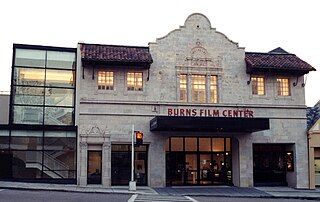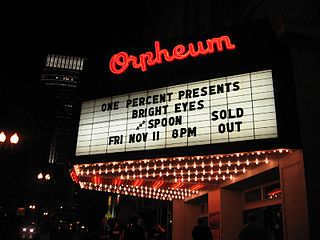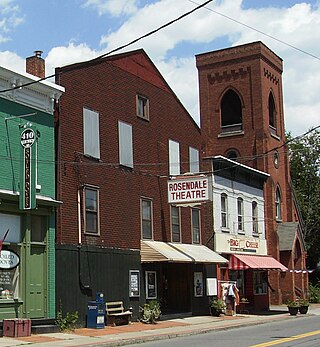
Constantine Alexander Payne is an American film director, screenwriter and producer. He is noted for his satirical depictions of contemporary American society. Payne has received numerous accolades, including two Academy Awards, a BAFTA Award and two Golden Globe Awards as well as a nomination for a Grammy Award.

The Carolina Theatre is a performing arts and cinema complex in downtown Durham, North Carolina. The facility is operated by a nonprofit organization named The Carolina Theatre of Durham, Inc. under a management agreement with the City of Durham, which owns the complex.

The Jacob Burns Film Center (JBFC) is a nonprofit cultural arts center located in Pleasantville, New York. It occupies the old Rome Theater, a Spanish mission-style theater built in 1925.

Film Streams is a nonprofit arts organization in Omaha, Nebraska which oversees two cinemas: the Ruth Sokolof Theater, in North Downtown Omaha, and the historic Dundee Theater, Omaha's longest surviving neighborhood cinema. It receives funding from corporate and individual donors, members, and the government.

Film Booking Offices of America (FBO), registered as FBO Pictures Corp., was an American film studio of the silent era, a midsize producer and distributor of mostly low-budget films. The business began in 1918 as Robertson-Cole, an Anglo-American import-export company. Robertson-Cole began distributing films in the United States that December and opened a Los Angeles production facility in 1920. Late that year, R-C entered into a working relationship with East Coast financier Joseph P. Kennedy. A business reorganization in 1922 led to its assumption of the FBO name, first for all its distribution operations and ultimately for its own productions as well. Through Kennedy, the studio contracted with Western leading man Fred Thomson, who grew by 1925 into one of Hollywood's most popular stars. Thomson was just one of several silent screen cowboys with whom FBO became identified.

An atmospheric theatre is a type of movie palace design which was popular in the late 1920s. Atmospheric theatres were designed and decorated to evoke the feeling of a particular time and place for patrons, through the use of projectors, architectural elements and ornamentation that evoked a sense of being outdoors. This was intended to make the patron a more active participant in the setting.
The Cooper Foundation of Lincoln, Nebraska, is a charitable and educational organization established in 1934 by Joseph H. Cooper, a long-time theater owner and former partner of Paramount Pictures. It supports nonprofit organizations in Lincoln and Lancaster County, Nebraska.

The culture of Omaha, Nebraska, has been partially defined by music and college sports, and by local cuisine and community theatre. The city has a long history of improving and expanding on its cultural offerings. In the 1920s, the Omaha Bee newspaper wrote, "The cultural future of Omaha seems as certain of greatness as the commercial future... The symphony orchestra, the Art institute, the Community Playhouse and other organizations are on firm foundations and Omaha is destined to be not only a bigger, but a better city, both financially and culturally." Reviewing Omaha's contemporary arts scene in 2007, the New York Times hailed the city as having "a kind of cultural awakening".

The Orpheum Theater is a theater located in Omaha, Nebraska. The theater hosts programs best served by a more theatrical setting, including the Omaha Performing Arts Broadway Season, presented with Broadway Across America, and Opera Omaha's season. The theatre is listed on the National Register of Historic Places. The main auditorium is a proscenium theater known as "Slosburg Hall". The theater has a theatre organ, made by Wurlitzer.

The Belcourt Theatre is a nonprofit film center located in Nashville's Hillsboro Village district.
The Regal Theatre, formerly known as the Chelsea Cinema, the Princess Theatre and the Ozone Marryatville or Marryatville Ozone Theatre, is a single-screen cinema in Kensington Park, a suburb of Adelaide, South Australia. Originally built in 1925, it retains the features of a major renovation in Art Deco style in 1941, and was heritage-listed on the state register in 1983. It is the oldest continuously running purpose-built cinema in Adelaide, and the only remaining silent cinema still operating.

The Barrymore Theatre is a 971-capacity live music venue on the east side of Madison, Wisconsin. Originally built as the Eastwood Theater in 1929, the Barrymore was founded by Richard "Sich" Slone and Tom Peterson in 1987 in an attempt to revive Madison's declining Schenk-Atwood neighborhood. The theater has hosted almost 3,000 shows and events including rock concerts, films, plays, dance recitals, broadcasts, political rallies, children's programming, and community events. Today the Barrymore is owned by the Schenk-Atwood Revitalization Association with Steve Sperling as general manager. It is an independent, community-based theater, owned by a nonprofit corporation.

The Music Box Theatre is a historic movie theater located in Chicago, Illinois. Built in 1929, it has been operating continuously as an art-house and repertory cinema since the early 1980s.

The nonprofit Crandell Theatre is located in the Village of Chatham, N.Y., and is Columbia County’s oldest and largest single-screen movie theater. The nearly 100-year-old community cinema is supported by ticket sales and earned revenue, contributions of members and friends, and private and public grants, including the New York State Council on the Arts with the support of the Office of the Governor and the New York State Legislature. The theater is dedicated to enriching the cultural vitality of the region through film programming that challenges, inspires, educates and entertains.

The Rosendale Theatre is a three-story, 260-seat movie theater and performance venue in Rosendale Village, a hamlet and former village in the town of Rosendale in Ulster County, New York. The building was opened as a casino in 1905, and began showing films in the 1920s. By the 1930s, a stage had been installed for live vaudeville and burlesque acts. The casino was eventually taken over by the local government, and used to house the town's fire department.
The Moon Theater was a silent movie theater at 1410 Douglas Street in Downtown Omaha, Nebraska. The 1,600-seat theater was built on the site of Omaha's first movie theater, the Parlor. In later years the theater was renamed the Town Theater and eventually the Cooper Theater. The building was demolished in 1976.
There are numerous community gardens in the U.S. state of Nebraska. A community garden is a piece of land collectively farmed by several people and may be created by local residents purchasing or taking over a vacant plot, or by an institution such as a church donating land to the community. In Nebraska many of the community gardens are to be found in or near the principal cities of Omaha and Lincoln, although examples may also be found in smaller communities such as Grand Island.
Rayart Pictures was one of the early film production and distribution companies operating independent of the major Hollywood studios in the United States during the later silent film era from the mid-to-late 1920s and into the early "talkies" era of early films with sound in the late 1920s and early 1930s. It established its own distribution network, specializing in westerns. It was started by W. Ray Johnston in 1924, after whom the company was named. It was originally created as a low budget release agent, and like the other so-called Poverty Row studios, was based in a small plot off Sunset Strip, by Gower Street. An early Poverty Row studio, it was a forerunner of Monogram Pictures, which was also founded by W. Ray Johnston.

The Embassy Theatre, also known as the Embassy 1 Theatre, is a former movie theater at 1560 Broadway, along Times Square, in the Midtown Manhattan neighborhood of New York City. Designed by Thomas W. Lamb, the theater opened in 1925 on the ground floor of 1560 Broadway, the headquarters of the Actors' Equity Association. While no longer in use as a theater, the space is preserved as a New York City designated landmark, and it continues to operate as a store.















